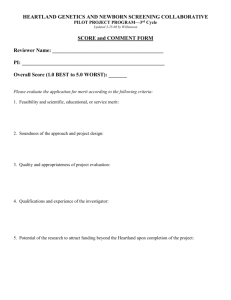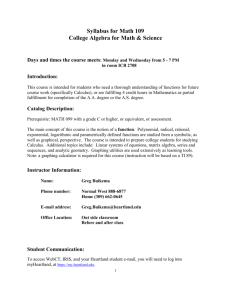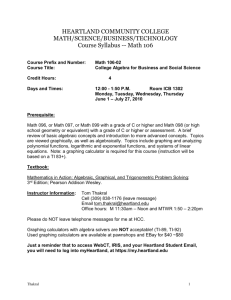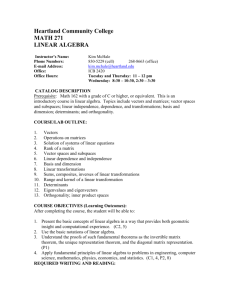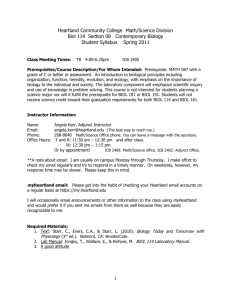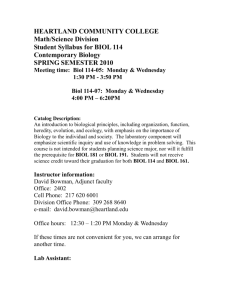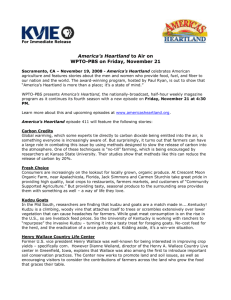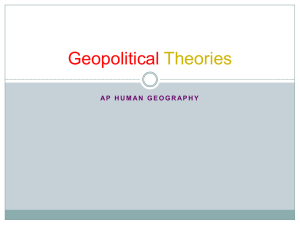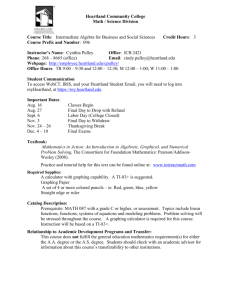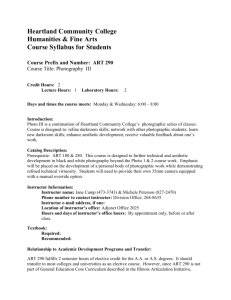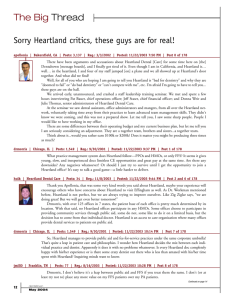MATH 109-03 Buikema - Heartland Community College
advertisement
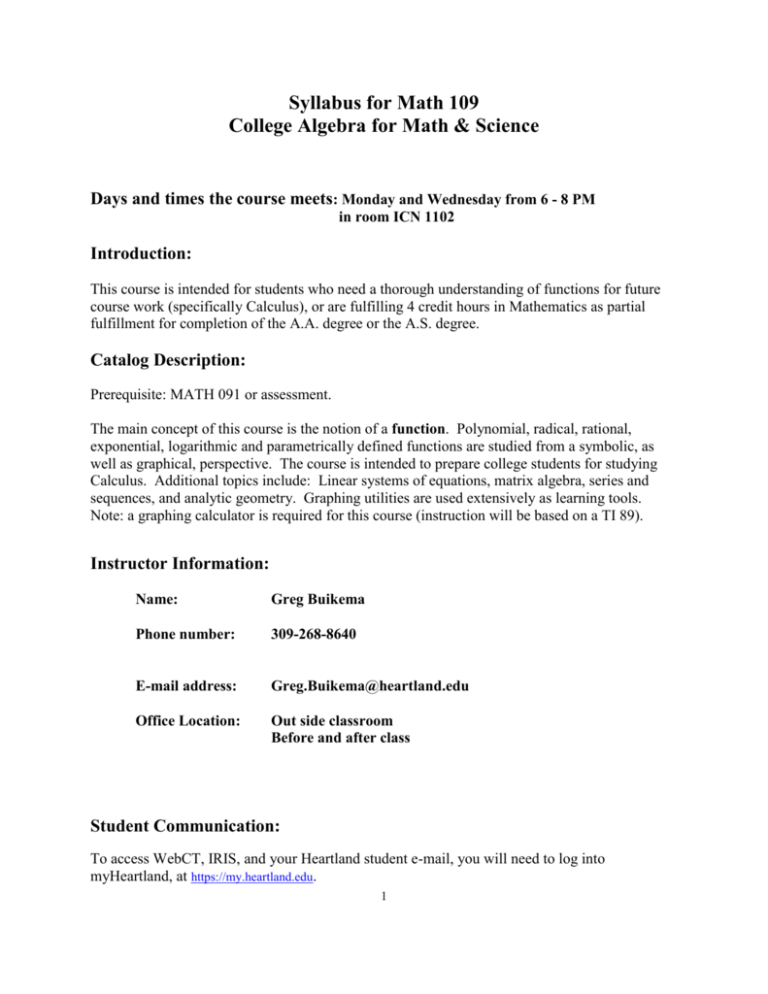
Syllabus for Math 109 College Algebra for Math & Science Days and times the course meets: Monday and Wednesday from 6 - 8 PM in room ICN 1102 Introduction: This course is intended for students who need a thorough understanding of functions for future course work (specifically Calculus), or are fulfilling 4 credit hours in Mathematics as partial fulfillment for completion of the A.A. degree or the A.S. degree. Catalog Description: Prerequisite: MATH 091 or assessment. The main concept of this course is the notion of a function. Polynomial, radical, rational, exponential, logarithmic and parametrically defined functions are studied from a symbolic, as well as graphical, perspective. The course is intended to prepare college students for studying Calculus. Additional topics include: Linear systems of equations, matrix algebra, series and sequences, and analytic geometry. Graphing utilities are used extensively as learning tools. Note: a graphing calculator is required for this course (instruction will be based on a TI 89). Instructor Information: Name: Greg Buikema Phone number: 309-268-8640 E-mail address: Greg.Buikema@heartland.edu Office Location: Out side classroom Before and after class Student Communication: To access WebCT, IRIS, and your Heartland student e-mail, you will need to log into myHeartland, at https://my.heartland.edu. 1 Textbook: Precalculus: Concepts through functions A Unit Circle Approach to Trigonometry 2011 Relationship to Academic Development Programs and Transfer: This course counts towards completion of the A.A. degree or the A.S. degree. Supplies: You will need a ruler and a TI-89 graphing calculator. A three-ring binder would be helpful since you will have numerous handouts to organize. Course Objectives (Learning Outcomes): After successful completion of this course, a student should be able to: 1. 2. 3. 4. 5. Apply various techniques to solve different types of equations and inequalities, including absolute value, radical, fractional, exponential and quadratic equations and inequalities. Define what a function is and graph certain functions in the Cartesian coordinate system using the ideas of symmetry, translations, reflection and stretching. Understand the relationship between a function and its inverse. Sketch the graphs and explore the special attributes of these function types: a. Polynomial functions b. Rational functions c. Radical functions d. Exponential functions e. Logarithmic functions Use graphing technology appropriately to achieve goals. Course Outline: 1. 2. 3. 4. 5. 6. 7. Equations and Inequalities Functions and Their Graphs Polynomial Functions Rational Functions Radical Functions Exponential Functions Logarithmic Functions Instructional Methods Instructional methods will include lectures, discussions, and group work that will emphasize applying problem solving strategies to discover and reinforce concepts. 2 Course Policies: Required Writing and Reading: Students are expected to read the material in the textbook for each section studied. Required writings will be part of most assignments and exams as students explain how they found the solution, describe their solution graphically, and interpret their answer in the context of the problem. Method of Evaluation (Exams, Grading System): There will be four exam and one final. Exams are 70% of the grade and they are weighted equally. The final exam is 20% of the grade. Participation is 5% of the grade. Assignments are 5% of the grade. No exams will be dropped. The grading scale will be as follows: 90-100% 80-89% 70-79% 60-69% 0-59% A B C D F Make-up of exams: If you are unable to take an exam at the scheduled time and have a valid, verifiable excuse, you must contact me BEFORE the exam, not after, or no make-up privilege will be allowed. If you have a valid, verifiable reason and have contacted me before the exam, I will put an exam in the testing center for you. If at all possible, you should take the exam before the next class period. If circumstances prevent you from doing this, you need to contact me as soon as possible by phone or e-mail to make other arrangements. Recall that no exams are dropped, if you do not take an exam your score for that exam is a zero. Attendance: Regular class attendance is an important part of educational success and is expected of all students. Students who miss class are responsible for the material covered that day, including obtaining the homework assignments and lecture notes. Attendance will not be a calculated part of your grade, but you are responsible for all announcements made in class. Student Evaluations: In the last 3-4 weeks of class, all students are expected to complete a course evaluation form online at www.studentevals.com/heartland. More information about evaluations will be provided in 3 class at the appropriate time. Notice of Cancelled Class Sessions: Cancelled class sessions, for all HCC classes, will be listed under Cancelled Class Meetings in the A-Z Index and under Academic Information in the Current Students page on the HCC Web site. Go to http://www.heartland.edu/classCancellations/ to learn what classes have been cancelled for that day and the upcoming week. Be sure to check the last column, which might contain a message from the instructor. Disability Statement: Any student who feels he/she may need an accommodation based on the impact of a disability should contact me privately to discuss your specific needs. Any student who has a documented disability and wishes to discuss academic accommodations should contact the Director of Disability Support Services, Anita Moore, at 268-8249 or anita.moore@heartland.edu. Incompletes: Please refer to the 2008-2010 Catalog and Student Handbook, page 184. Academic Integrity, Plagiarism, and Student Conduct: Please refer to 2008-2010 Catalog and Student Handbook, pages 178 and 181. Support Services: Please refer to the 2008-2010 Catalog and Student Handbook, pages 184-186 and 189-190. Heartland Library: http://www.heartland.edu/library (309) 268-8292. Academic Support: Normal Center (309) 268-8291; Pontiac Center (815) 842-6777; Lincoln Center (217) 735-1731. Tutoring Center: http://www.heartland.edu/asc/tutor.html (309) 268-8231 Testing Center: http://www.heartland.edu/asc/testing.html (309) 268-8231 Computer Lab: http://www.heartland.edu/asc/computerlab.html (309) 268-8284 Syllabus disclaimer: This syllabus is subject to change. Any changes will be announced in class. 4 Day-to-Day Tentative Schedule Jan 18 Jan 23 Jan 25 Jan 30 Feb 1 Feb 6 Feb 8 Feb 13 Feb 15 Feb 20 Feb 22 Feb 27 Feb 29 March 5 March 7 March 19 March 21 March 26 April 2 April 4 April 9 April 11 April 16 April 28 April 23 April 25 April 30 May 2 May 7 May 9 May 14 Intro Sections 1.1 Sections 1.2-1.3 Sections 1.4-1.5 Sections 1.6-1.7 Review Test 1 Sections 2.1 Sections 2.2-2.3 Sections 2.4-2.5 Section 2.6 Section 2.7 Section 2.8 Review Test 2 Section 3.1 Section 3.2 Section 3.3 Section 3.4 Section 3.5 Review Test 3 Sections 4.1-4.2 Section 4.3 Section 4.4-4.5 Section 4.6-4.7 Section 4.8-4.9 Review Test 4 Review Final Exam 5
